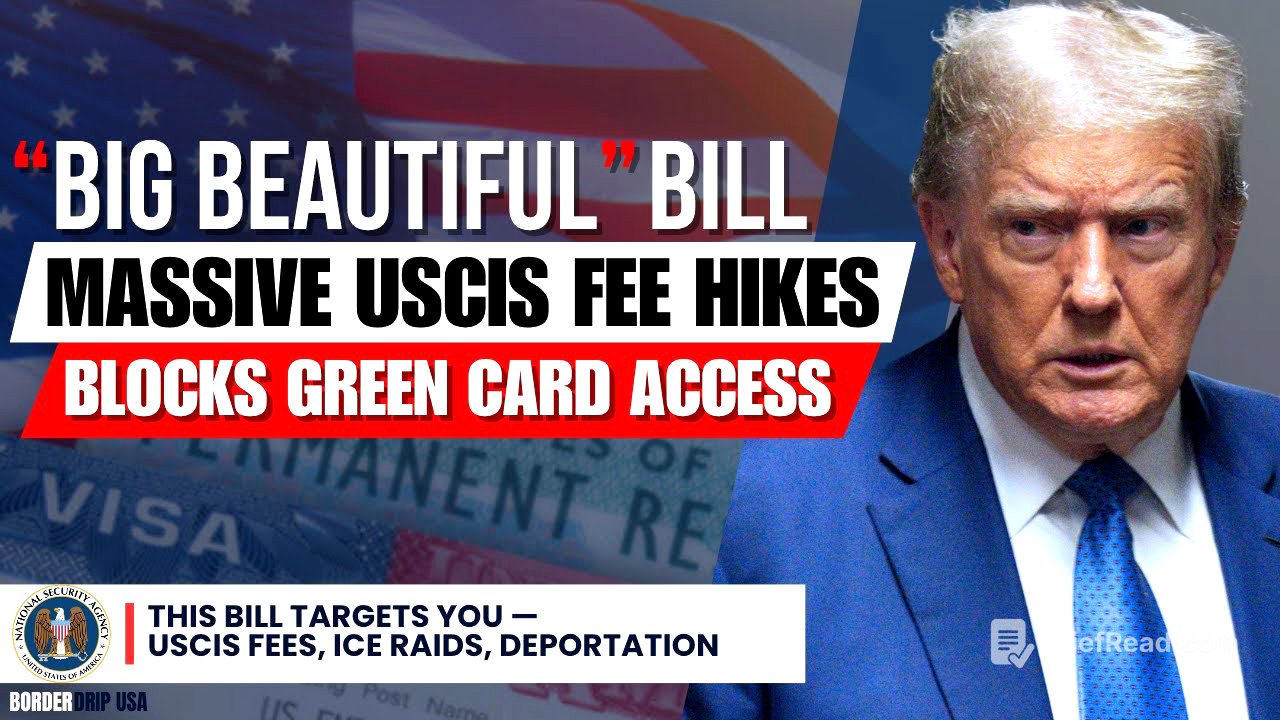TLDR;
This video discusses HR1, also known as Trump's big beautiful bill, and its potential impact on immigration in the United States. It highlights key provisions of the bill, including increased funding for border security and deportations, higher immigration fees, restrictions on federal benefits, and potential changes to birthright citizenship. The video emphasizes the urgency for immigrants and their families to seek legal advice and take action to protect their rights.
- Increased funding for border security and deportations
- Higher immigration fees and restricted federal benefits
- Potential changes to birthright citizenship
- Urgency for immigrants to seek legal advice and take action
Introduction: The Big Beautiful Bill [0:14]
The video introduces HR1, referred to as Trump's big beautiful bill, as a potentially extreme immigration bill in US history. It outlines the bill's key components, including mass deportations, asylum application fees, ICE raids, green card delays, and attacks on birthright citizenship. With a Senate vote expected soon, the video stresses the urgency of understanding and acting against the bill's measures. The bill is described as fulfilling many of Trump's second-term promises, encompassing expanded border wall construction, fee hikes on immigration forms, restrictions on birthright citizenship and child benefits, and increased powers for ICE.
Border Wall and Enforcement Funding [1:22]
The bill allocates significant funding towards border security and enforcement. $46 billion is designated to complete 71 miles of new wall, 900 miles of river barriers, and 629 miles of secondary fences. Additionally, $4 billion is allocated to hire 3,000 new border patrol agents and 5,000 new customs officers, with $2.1 billion for signing bonuses and retention pay. This increased manpower signals a heightened focus on arresting and targeting undocumented immigrants and visa overstayers.
Mass Deportations [2:09]
The bill allocates $150 billion for mass deportations, with $14 billion immediately for ICE enforcement and deportation operations. The remaining funds are reserved over the next four years for raids on homes and workplaces, surveillance operations, face recognition technology, and real-time alerts for re-entering deported immigrants. ICE is set to become a massive, well-funded force with the goal of 1 million deportations per year.
Immigration Courts Fasttrack Removal [2:46]
The bill funds the expansion of immigration courts with $1.2 billion to hire more judges and speed up deportation hearings, while limiting court protections. A clause prohibits federal judges from enforcing temporary restraining orders in immigration cases, potentially preventing lawyers from temporarily stopping deportations.
Increased Immigration Fees [3:15]
The bill introduces the most aggressive immigration fee hikes in US history, including a $1,000 asylum application fee (previously free), a $100 annual asylum maintenance fee, a $550 work permit renewal fee every 6 months, a $900 court appeal fee (up from $100), and a new processing fee for the green card lottery entry. Unaccompanied minor sponsorship would cost $3,500 upfront plus $5,000 per child. These fees disproportionately affect working-class and lower-income immigrants, potentially shutting them out of the system.
Restricting Federal Benefits [4:03]
The bill blocks access to essential benefits for millions, including US citizens. It restricts the child tax credit for US citizen children with undocumented parents, potentially excluding 4.5 million children despite being born in the US. This tactic aims to make life harder for families, encouraging them to leave voluntarily.
Remittance Tax [4:25]
A 3.5% remittance tax is imposed on transfers by non-citizens to foreign countries. This penalty affects immigrant workers who send money to support their families back home, reducing the amount they can send.
Birthright Citizenship Restrictions [4:46]
The bill aims to end birthright citizenship, allowing states to opt-in to denying automatic citizenship to children born to non-citizen parents. Federal courts would be blocked from intervening. This could affect tourists, temporary visa holders (F1, H1B, etc.), undocumented immigrants, and even some lawful residents.
Children Under Surveillance [5:22]
DHS must conduct gang and criminal checks on children as young as 12, using tattoo checks and biometric scans on unaccompanied minors. Sponsor households will also be screened, including their immigration status, with sponsor fees potentially reaching $5,000 per child. This will likely lead to fewer people sponsoring children, resulting in longer detention in shelters and government custody.
Recommendations [5:53]
The video advises undocumented individuals, green card holders, and those in the midst of any immigration process to meet with an immigration attorney immediately to explore legal options. Green card holders should apply for US citizenship, and those eligible for adjustment of status should file before new fees and barriers take effect. Those with DACA, TPS, or pending asylum cases should prepare for possible legal changes and new annual fees.
Hidden Costs [6:32]
The bill's true cost could reach $1 trillion over the next decade, despite the official $150 billion set aside for deportation enforcement over 4 years. Independent analysts believe the Congressional Budget Office didn't account for downstream costs like detention, court operations, surveillance infrastructure, and legal challenges. ICE could become the most heavily funded law enforcement agency in the country.
Summary: What This Bill Really Means [7:22]
The bill is a full-scale strategy to reduce immigration through pressure, poverty, and fear, with more ICE, court restrictions, higher fees, fewer protections, less access to benefits, and possibly fewer rights for US-born children. Even if the bill doesn't pass, it shows the blueprint for future immigration policies. The video urges viewers to act now to secure their future as the system shifts and the window of opportunity closes.









